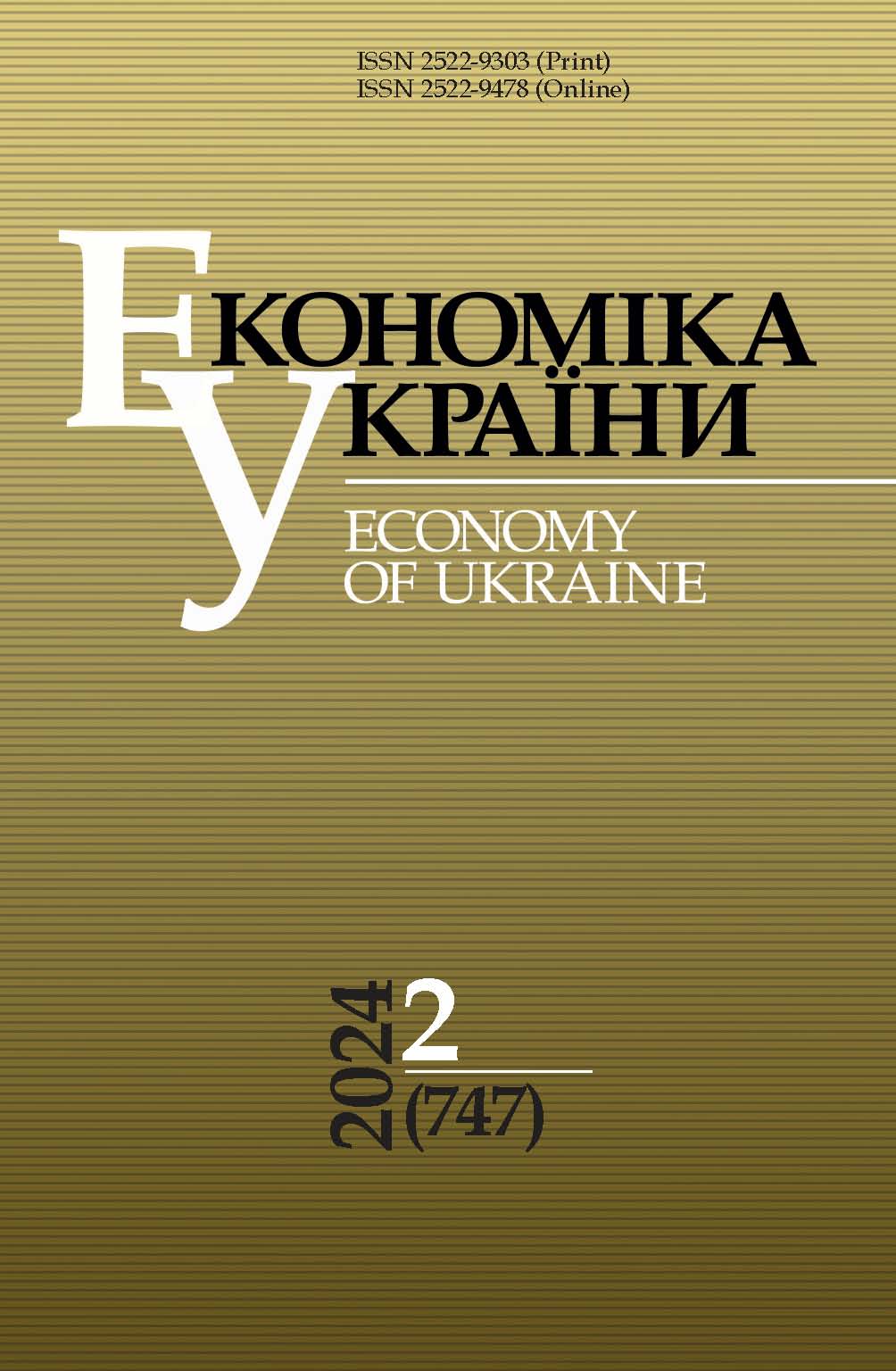ACTIVITY-BASED KNOWLEDGE-INFORMATION THEORY OF VALUE: CONCEPTUAL AND SENSORIAL-EMOTIONAL THEORETICAL MODELS
DOI:
https://doi.org/10.15407/economyukr.2024.02.032Keywords:
activity; value; theory in a broad sense; truth interval; knowledge-information product; general theory of value; activity-based knowledge-information theory of value; prerequisites and dimensions of the theory; conceptual theoretical model; sensorial-emotional theoretical modelAbstract
The conceptual and sensorial-emotional theoretical models (schemes) of the activity-based knowledge-information theory of value (AKITV) or the activity-based theory of the knowledge-information product value are considered. The main ontological (recent co-revolution, integrative picture of economic reality), gnoseological (post-nonclassicism, critical realism, trialectic, integrative method), axiological (universals of culture, ethos of science) and praxeological (imperatives of syntagmatic revolution) prerequisites and the interval of truth for AKITV are defined, as well as its place in the temporal space of the general theory of value and fundamental economic science. Considering the dialectic of the general and the particular, the conceptual makeup and structure of AKITV as a special theory of value in a broad sense, that is, a complex synergistic-type system, a unity of interconnected and interacting theoretical schemes (models) as its subsystems, is proposed. The conceptual theoretical scheme is a kind of avant-garde in AKITV. Sensorial-emotional, empirical-abstract and fundamental theoretical schemes correspond to the descending steps in ascent from the sensorial-concrete to the utterly abstract. Fundamental, partial ("distribution", "exchange", "consumption") and integral partial-applied theoretical schemes correspond to the ascending steps in ascent from the studied and ordered abstract image of the object to the general concrete one. The immediate object of AKITV is the production of a knowledge-information product in the broad sense, as well as cognitive activity (its attributes and outcomes), which is performed in the spheres of humanization and objectification of the modern information and digital economy. The subject space of AKITV is represented by value relations between actors in the process of production in a broad sense and cognitive activity concerning the process itself and its main outcomes, primarily the knowledge-information product. The technical-economic, general economic, socio-economic and organizational-economic dimensions of AKITV are indicated. In the sensorial-emotional theoretical model, the economic value of a sensorial-emotional knowledge-information product as an image of the surface layer of an existing real object is emphasized.
References
Tarasevych, V. (2021). Theoretical dimension of information-digital economy: foundations and system of primary information phenomena. Economy of Ukraine. 64. 1(710). 3-23. https://doi.org/10.15407/economyukr.2021.01.003 [in Ukrainian].
Tarasevych, V. (2021). Theoretical dimension of the information-digital economy: information activity and the system of the derived information phenomena (products). Economy of Ukraine. 64. 3(712). 3-18. https://doi.org/10.15407/economyukr.2021.03.003 [in |Ukrainian].
Tarasevych, V. (2021). Theoretical dimension of information-digital economy: information-digital processes and their attributes. Economy of Ukraine. 64. 6(715). 21-35. https://doi.org/10.15407/economyukr.2021.06.021 [in Ukrainian].
Tarasevych, V. (2021). Modern co-revolution: activity content and dialectics of informative and cognitive systems. Economy of Ukraine. 64. 10(719). 3-18. https://doi.org/10.15407/economyukr.2021.10.003 [in Ukrainian].
Tarasevych, V. (2022). Modern co-revolution: a mechanized man and/or a humanized machine. Economy of Ukraine. 65. 2(723). 20-36. https://doi.org/10.15407/economyukr.2022.02.020 [in Ukrainian].
Tarasevych, V. (2022). On general and special theories of value. Economy of Ukraine. 65. 12(733). 13-33. https://doi.org/10.15407/economyukr.2022.12.013 [in Ukrainian].
Tarasevich, V. (2017). Fundamental economic science: universality of content and development. Dnepr. 1022 p. [in Russian].
Tarasevych, V., Bilotserkivets, V., Zavhorodnya, O. et al. (2021). The digital dimension of the innovation and information economy. V. Tarasevych (ed.). Dnipro. 448 p. [in Ukrainian].
Vyshnevskyi, V., Viyetska, O., Viyetskyi, O. et al. (2019). Smart industry: directions of development, problems and solutions. V.P. Vyshnevskyi (ed.). Kyiv. 464 p. [in Ukrainian].
Vyshnevskyi, V., Knyazev, S. (2017). Smart industry: prospects and challenges. Economy of Ukraine. 60. 7(668). 22-37 [in Ukrainian].
Tarasevich, V. (2021). Theoretical dimension of information and digital phenomena in economy. Dnepr. 108 p. [in Russian].
Ambrozyak, N., Voronaya, N., Nesterenko, M., Chernyshova, N. (2018). Intellectual property objects: legal basis. Taxes & Accounting. No. 58. URL: https://i.factor.ua/journals/nibu/2018/july/issue-58/ [in Russian].
Glushko, E. (2009). Features of intellectual property objects pricing. Bulletin of Khmelnytskyi National University. Vol. 2. No. 6. P. 200-206 [in Russian].
Downloads
Published
How to Cite
Issue
Section
License
Copyright (c) 2024 Publisher PH "Academperiodyka" of the NAS of Ukraine

This work is licensed under a Creative Commons Attribution-NonCommercial-NoDerivatives 4.0 International License.



